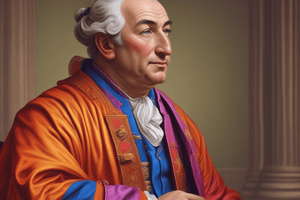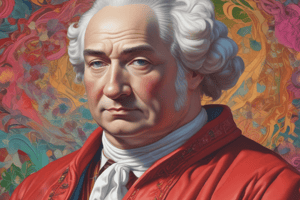Podcast
Questions and Answers
What is David Hume best known for?
What is David Hume best known for?
- His rejection of causality
- His development of innate ideas
- His work as a historian and economist
- His highly influential system of philosophical empiricism, skepticism, and naturalism (correct)
What did Hume argue against?
What did Hume argue against?
- The importance of experience in human knowledge
- The existence of innate ideas (correct)
- The existence of the self
- The role of reason in human behavior
What did Hume argue about inductive reasoning and causality?
What did Hume argue about inductive reasoning and causality?
- They are innate ideas
- They are based on abstract moral principles
- They are the only sources of human knowledge
- They cannot be justified rationally (correct)
According to Hume, what governs human behavior?
According to Hume, what governs human behavior?
What did Hume believe ethics were based on?
What did Hume believe ethics were based on?
What did Hume deny the existence of?
What did Hume deny the existence of?
What is Hume's theory of free will?
What is Hume's theory of free will?
What was controversial about Hume's philosophy of religion?
What was controversial about Hume's philosophy of religion?
What is the bundle theory of personal identity?
What is the bundle theory of personal identity?
Flashcards
Hume's Empiricism
Hume's Empiricism
Hume's belief that all knowledge comes from sensory experience.
Inductive Reasoning
Inductive Reasoning
Reasoning that draws general conclusions from specific observations.
Bundle Theory of Self
Bundle Theory of Self
Hume's idea that the self is merely a collection of perceptions.
Hume's Theory of Causation
Hume's Theory of Causation
Signup and view all the flashcards
Compatibilism (Free Will)
Compatibilism (Free Will)
Signup and view all the flashcards
Sentimentalism
Sentimentalism
Signup and view all the flashcards
Is-Ought Problem
Is-Ought Problem
Signup and view all the flashcards
Hume's Philosophy of Religion
Hume's Philosophy of Religion
Signup and view all the flashcards
A Treatise of Human Nature
A Treatise of Human Nature
Signup and view all the flashcards
Study Notes
Life and Philosophy of David Hume
-
David Hume was a Scottish Enlightenment philosopher, historian, economist, librarian, and essayist.
-
He is best known for his highly influential system of philosophical empiricism, skepticism, and naturalism.
-
Hume argued against the existence of innate ideas, positing that all human knowledge derives solely from experience.
-
He argued that inductive reasoning and belief in causality cannot be justified rationally; instead, they result from custom and mental habit.
-
Hume held that passions rather than reason govern human behaviour, famously proclaiming that "Reason is, and ought only to be the slave of the passions."
-
Hume was also a sentimentalist who held that ethics are based on emotion or sentiment rather than abstract moral principle.
-
Hume denied that humans have an actual conception of the self, positing that we experience only a bundle of sensations.
-
Hume's compatibilist theory of free will takes causal determinism as fully compatible with human freedom.
-
His philosophy of religion, including his rejection of miracles and the argument from design for God's existence, were especially controversial for their time.
-
Hume left a legacy that affected utilitarianism, logical positivism, the philosophy of science, early analytic philosophy, cognitive science, theology, and many other fields and thinkers.
-
Hume's most important work, A Treatise of Human Nature, was published when he was only 28 years old and is now regarded as one of the most important in the history of Western philosophy.
-
Hume's volume of Political Discourses, written in 1749 and published in 1752, was the only work he considered successful on first publication.Summary Title: The Life, Writings, and Philosophy of David Hume
-
David Hume was a philosopher and historian who was born in Edinburgh, Scotland in 1711 and died in 1776.
-
Hume had a falling out with Jean-Jacques Rousseau during his time in France, which led him to write an account of the dispute titled "A concise and genuine account of the dispute between Mr. Hume and Mr. Rousseau".
-
Hume was appointed Under Secretary of State for the Northern Department in 1767 and returned to Edinburgh in 1769, where he would live until his death in 1776.
-
Hume's nephew and namesake, David Hume of Ninewells, was a co-founder of the Royal Society of Edinburgh in 1783 and is buried with his uncle in the Old Calton Cemetery.
-
Hume wrote an autobiographical essay titled "My Own Life" in the last year of his life, which contains many interesting judgments on his life and work.
-
Hume believed that the mind consists of perceptions, which divide into two categories: impressions and ideas, and that all ideas are ultimately copied from some original impression.
-
Hume's epistemology is based on the problem of induction, which concerns the plausibility of inductive reasoning, and his solution is to argue that natural instinct explains the human practice of making inductive inferences.
-
Hume's theory of causation is split into two realms: Relations of Ideas, which are a priori and represent universal bonds between ideas, and Matters of Fact, which are dependent on the observer and experience.
-
Hume explains his theory of causation and causal inference by division into three different parts: the Critical Phase, the Constructive Phase, and Belief.
-
Hume's philosophy is often seen as a forerunner of logical positivism, but many commentators have rejected this understanding of Humean empiricism, stressing an epistemological reading of his project.
-
Hume's tomb stands on the southwestern slope of Calton Hill, in the Old Calton Cemetery, and he requested that it be inscribed only with his name and the year of his birth and death, "leaving it to Posterity to add the Rest".
-
Hume believed that the love of literary fame served as his "ruling passion" in life, and he wrote of his social relations that "My friends never had occasion to vindicate any one circumstance of my character and conduct."David Hume: A Summary
-
Hume believed that causation is equivalent to regularity in perception, but sceptical realists argue that causation is more than just regular succession of events.
-
Hume rejected the idea of power or necessary connection between objects, but accepted the causal principle. He denied the possibility of knowing the powers between objects.
-
Hume favoured the bundle theory of personal identity, where the self is nothing but a bundle of experiences linked by causation and resemblance.
-
Some philosophers have criticised Hume's bundle-theory interpretation of personal identity and suggested that he might have been answering an epistemological question about the causal origin of our concept of the self.
-
Hume denied the existence of practical reason as a principle because he claimed reason does not have any effect on morality.
-
Hume's writings on ethics began in his Treatise of Human Nature and were refined in his An Enquiry Concerning the Principles of Morals. He understood feeling, rather than knowing, as that which governs ethical actions.
-
Hume put forward the is-ought problem, denying the possibility of logically deriving what ought to be from what is.
-
Hume's ideas about aesthetics and the theory of art are spread throughout his works, but particularly connected with his ethical writings.
-
Hume was a classical compatibilist about the notions of freedom and determinism.
-
Hume's 1757 dissertation "The Natural History of Religion" argues that the monotheistic religions of Judaism, Christianity, and Islam all derive from earlier polytheistic religions, and that all religious belief "traces, in the end, to dread of the unknown".
-
Hume's personal views on religion have been the subject of much debate, with some modern critics describing him as agnostic or a "Pyrrhonian skeptic", while contemporaries considered him to be an atheist.
-
Hume supported the standard religious views of his time and place in works such as "Of Superstition and Enthusiasm", but also presented arguments suggesting that polytheism had much to commend it over monotheism.Hume's views on religion were complex, with some arguing he was a religious naturalist, while others suggest he was an irreligious sceptic or weakly deistic. He critiqued the argument from design, suggesting it relied on experience and observation, and questioned whether the universe was proof of a deity. Hume also challenged the notion of miracles, suggesting they were unlikely to have occurred due to a lack of empirical evidence and the tendency of people to lie or be mistaken. However, he recognized that belief in miracles was popular and often uncritically accepted. Hume's six-volume work, The History of England, was a seminal text in the field of cultural history, with a focus on the quest for liberty and the disastrous effects of religion on progress. His coverage of political upheavals took a moderate royalist position, and he emphasized religious differences more than constitutional issues. Hume's writings have been described as seminal to conservative theory, but his ideas, such as limited government and constitutionalism, are first principles of liberalism. A major concern of Hume's political philosophy was the importance of the rule of law.
Studying That Suits You
Use AI to generate personalized quizzes and flashcards to suit your learning preferences.




